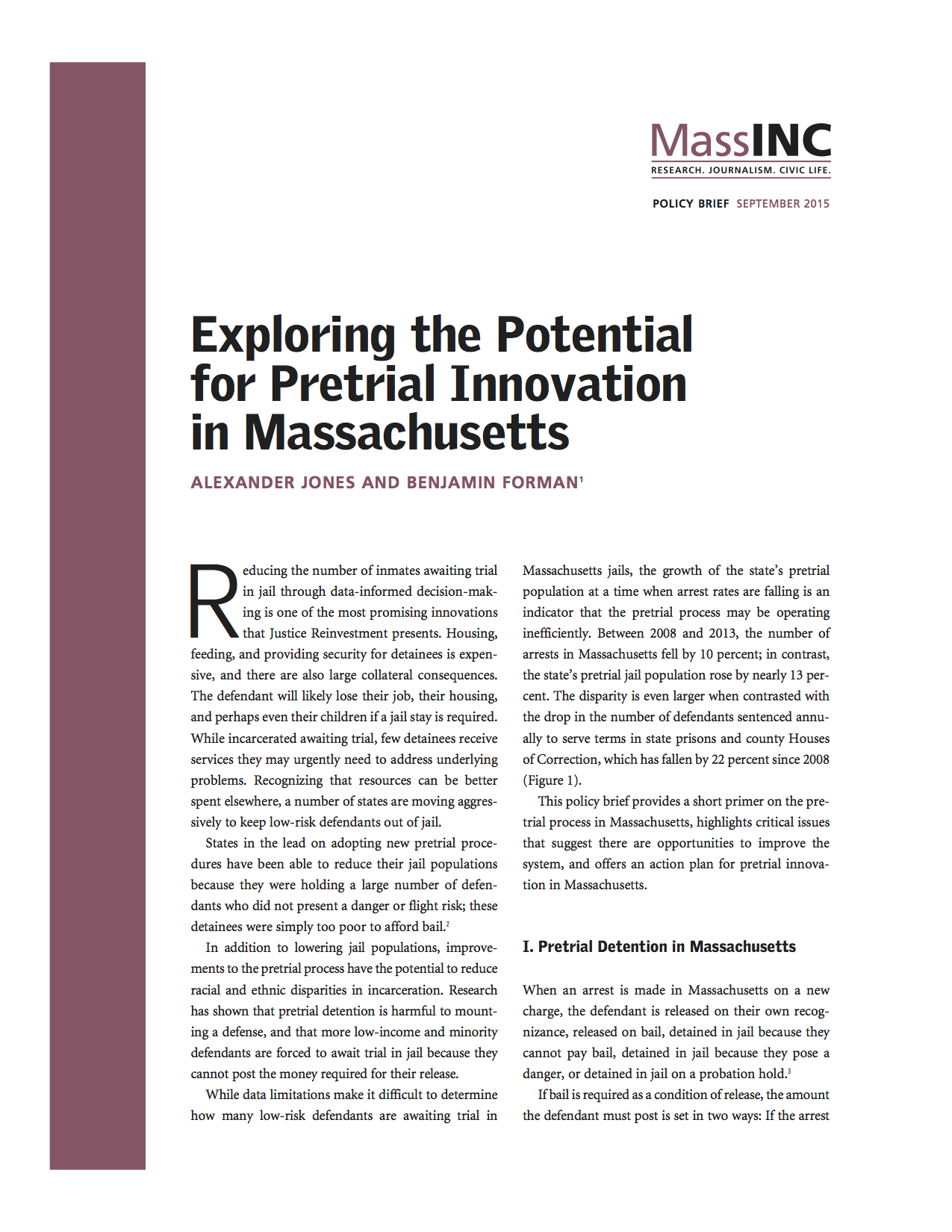MassINC and the Criminal Justice Reform Coalition are excited to announce the launch of the Justice Reinvestment Policy Brief Series. Over the coming months, this new research initiative will succinctly examine Justice Reinvestment in Massachusetts with the release of several policy primers exploring critical criminal justice issues.
As many of you will have already seen, we kicked off the series last week with a policy brief providing new data on the state’s  pretrial process. Our findings revealed large racial and ethnic disparities in the composition of defendants awaiting trial in jail across Massachusetts. Not surprisingly, this data created significant buzz from all corners of the criminal justice community as well as from the media.
pretrial process. Our findings revealed large racial and ethnic disparities in the composition of defendants awaiting trial in jail across Massachusetts. Not surprisingly, this data created significant buzz from all corners of the criminal justice community as well as from the media.
While the policy brief raises as many questions as it answers, the analysis underscores how critical data are to public safety decision-making. Around the country, states are taking a data-driven approach to reduce incarceration and increase public safety. Many states have found ample opportunity to improve their pretrial process by keeping low-risk defendants out of jail and redirecting resources toward more effective uses, like treatment and community supervision.
As we continue the Justice Reinvestment Policy Brief Series, our focus will be on synthesizing new data for policymakers. In the coming weeks, we will be releasing reports examining young adult offenders, drug offenders, female offenders, and offenders returning to the community. The final brief in the series will summarize
what we’ve learned along the way about the state of the state’s criminal justice information systems, offering recommendations for how we can ensure that officials and policymakers have access to the information they need to make informed decisions.
Over the fall and right through the winter, we will be hosting a number of events to share our findings and further the civic dialogue. Stay tuned for more information on these gatherings. Lastly, an appeal for your assistance: Help us build a larger constituency for evidence-based change by forwarding this journal on to others. Also, please consider donating to MassINC. We rely heavily on your generosity to produce objective nonpartisan research.
–Ben Forman
As we release Justice Reinvestment Series Policy Briefs, each edition of our journal will be topical. This month’s links focus on pretrial reform.
Pretrial In the States
Equal Justice Under Law challenged money bail systems in federal court in Alabama with the case Varden v. City of Clanton, prompting the DOJ to file a Statement of Interest in the case and the US to declare that detaining people solely because of their poverty is unconstitutional. The City of Clanton is now reforming its bail system.
Ten years after Hurricane Katrina hit New Orleans, Louisiana, a NY Times editorial and a paper co-authored by the Vera Institute for Justice explore changes in the criminal justice practices of the city, which includes New Orleans Pretrial Services, an organization that “identifies lower-risk arrestees who cannot afford bail and recommends judges release them on their own recognizance.”
Learn about the joint effort between Californians for Safety and Justice and the Crime and Justice Institute to survey California’s pretrial practices and services here.
Three New Jersey counties scheduled to start a pilot program for bail reform in 2016 voice concerns about meeting staffing and funding requirements. Under the new reform, most offenders will be released with conditions and remain under some sort of supervision.
In Connecticut, where there are no county jails (only state prisons), Governor Malloy’s administration looks for ways to reduce its prison population. One area of focus is indigent pretrial detainees.
New York’s chief judge, Jonathan Lippman, announces plans to reform the bail system.
Pretrial Here in Massachusetts 
Writing for Communities and Banking, a publication of the Federal Reserve Bank of Boston, Francesca Forrest describes the problems with cash bail.
In Springfield, Mayor Sarno presses for new legislation that would make it possible for prosecutors to appeal low bails.
Pretrial In the Media
Jan Ransom of the Boston Globe talks to both MassINC research director Ben Forman and District Attorneys Michael D. O’Keefe and David F. Capeless after MassINC releases a report showing that minorities are more likely have bail set at higher amounts.
The New York Times Magazine explores the “bail trap,” where people who are eventually found innocent must first languish in jail because they cannot afford to pay bail, and can have subsequent consequences such as loss of jobs, housing, and custody of their children.
Shaila Dewan, also for the New York Times, highlights several individuals affected by their inability to post bail. The New Yorker outlines the case against cash bail.
The Marshall Project reports on Alec Karakatsanis of Equal Justice Under the Law’s “quest to stop courts from punishing poor people who can’t pay their fees.”
Pretrial From the Researchers
A new Brennan Center report includes a section on the unnecessary use of pretrial detention.
The Council for State Governments Justice Center takes a look at how treatment of people with mental illness can be improved at the pretrial stage. One key component that should apply not only to people with mental illness but defendants across the board: “decisions about custody or release should not be determined by factors such as an individual’s gender, race, ethnicity, or financial resources.”
